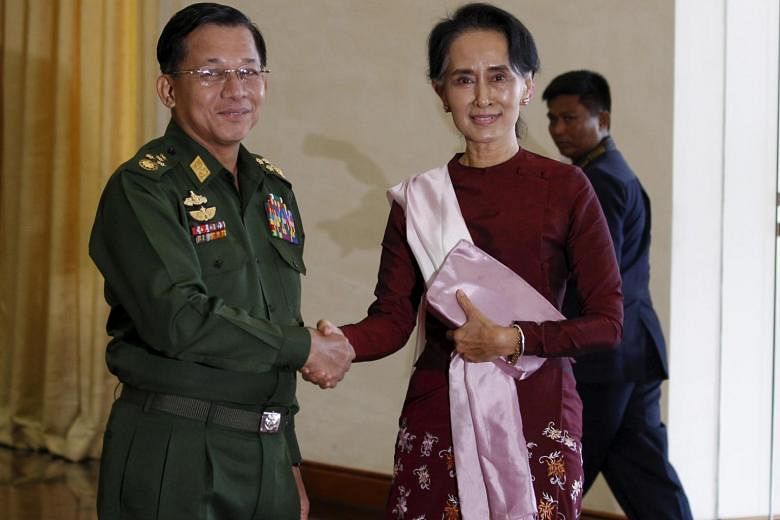YANGON - A Myanmar minister's comments have put the civilian government in the crosshairs of its powerful military, in what could be a test of their carefully cultivated relations so far.
Yangon chief minister Phyo Min Thein, billed by some as a rising star, said earlier this week that Myanmar was not a full-fledged democracy, given the elevated status of its military and commander-in-chief Min Aung Hlaing. "There are no civil-military relations in the democratic era, and the military must be under a civilian government," he said, adding that the commander-in-chief's position was equivalent to that of a director-general.
The military now functions independently of the National League for Democracy (NLD)- led government. It controls the defence, home affairs and border affairs ministries, as well as a quarter of all parliamentary seats. And it guards its reputation like a hawk.
The military demanded on Tuesday (July 11) that the government take action against the chief minister for this slight. It alleged that Mr Phyo Min Thein's comments were "reckless and confrontational", and his presence was not conducive to the "long-term" relationship between the government and armed forces.
On Wednesday, NLD spokesman Nyan Win told DVB news outlet that there was no reason to take action.
Presidential office spokesman Zaw Htay however told The Straits Times it sent a letter to the military on Thursday after receiving the military's complaint. He declined to disclose its contents.
This row is unfolding more than a year since Myanmar's de facto leader Aung San Suu Kyi took on the delicate task of reforming a country dimmed by 50 years of junta rule while maintaining good relations with the military, which is guaranteed under the constitution to hold some of the reins.
"Generally, the NLD and NLD-government have been very cautious, even overly cautious, in not offending the military," Mr Soe Myint Aung, the founder of Tagaung Institute of Political Studies, tells The Straits Times.
Ms Suu Kyi, a Nobel peace prize winner, has not questioned the military's crackdown in Rakhine state, launched after insurgents attacked border posts there last year. The government says it will not grant visas to United Nations investigators tasked with looking into allegations of human rights abuses there.
NLD researcher Myo Yan Naung Thein, who criticised Senior General Min Aung Hlaing's role in the Rakhine state situation, was charged with defamation via a controversial telecommunications law and sentenced in April to six months' jail.
Movies have not been spared in these sensitive times. "Twilight over Burma", a film based on the true life story of an ethnic Shan prince who died under mysterious circumstances following the 1962 military coup, was pulled by censors from a film festival last year over fears that it might hurt the army's image.
But the events this week involve an elected politician at the helm of Myanmar's financial capital, who has risen quickly up the ranks since joining the NLD in 2012. Some observers wonder if it might hurt the NLD to censure the chief minister at the military's behest.
"An elected chief minister should have a right to speak," says Mr Moe Thway, who heads the Generation Wave political activist group. "Otherwise, why should we elect them?"
Relations between the NLD and the military as a whole are far from damaged, stresses Tagaung Institute's Mr Soe Myint Aung. "But is it really in the military's interest to pursue elected politicians? I wouldn't think so."


